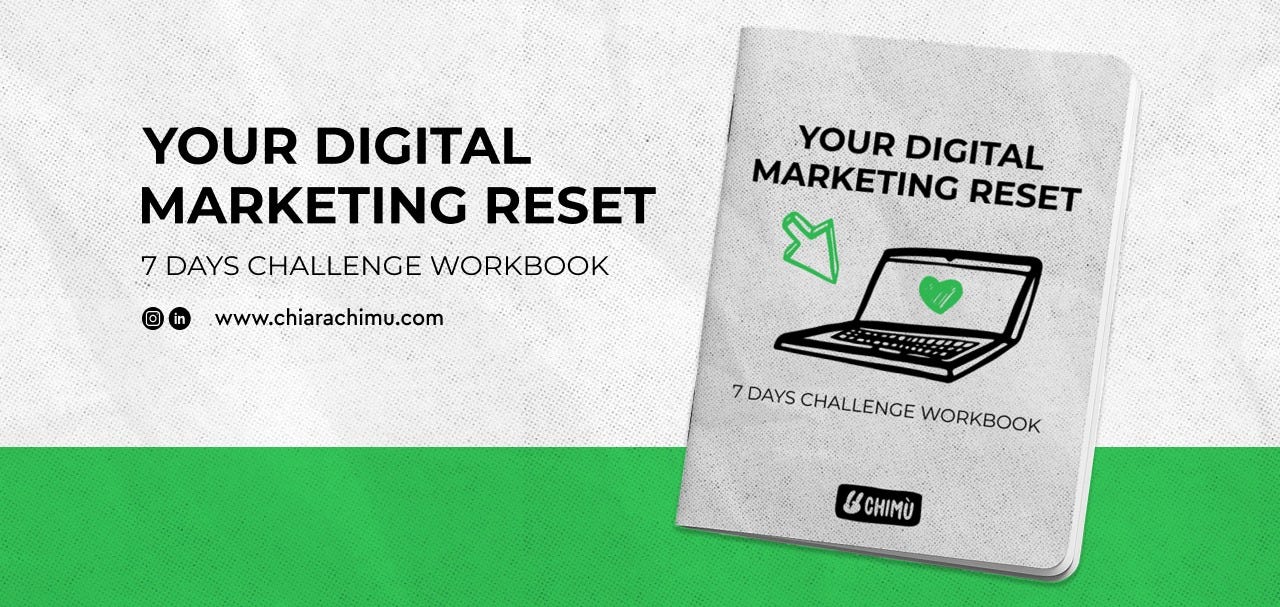Why Today Niching Down Isn’t About Market Share But About Survival For Conscious Small Businesses
In 2025, being good at what you do isn’t enough. If you run a small, purpose-driven business, you know this very well. So how can you improve your digital presence now that there are so many channels
Don’t like to read? Watch it or listen to it like a podcast on my Youtube channel:
Please, before you roll your eyes and think, “Here we go again, another coach telling me to niche down,” hear me out.
This isn’t the usual fluffy chat about picking a niche. This is about why niching down makes your marketing more efficient and your business more visible, now more than ever. And I promise, this will be practical.
Niching is not about market share
Big companies can afford to talk to everyone. You can’t.
When you try to appeal to everyone, your message becomes vague, bland.
When you choose a clear niche instead, your messaging gets sharper. Instead of “we sell natural skincare,” you end up saying, “we make low-waste skincare for people with sensitive skin who are tired of greenwashing.”
You give a chance to audience to feel seen instantly. They think “Finally, someone is talking to me!”. Your marketing efforts work harder because every single piece of communication has a clear target.
And just to be clear, niching down doesn’t mean I (or you) can’t work with people outside the niche. For example, I can help a small business that teaches yoga online or a copywriter who works with tech companies. In fact, some of my clients are outside my niche and I still help them grow. But my own messaging stays very focused, because that’s what makes marketing efficient for me in the bigger picture, while staying true to my mission.
I know you don’t like to hear this, but the marketing landscape just changed again. And that’s why you need to be more proactive than yesterday
I hate making you anxious (if you’ve been here before you know my mission) but AI brought some major changes to the game and if we want to play, we need to adapt.
1. AI has changed how people search
People don’t just Google anymore. They ask ChatGPT, Perplexity, and Gemini.
And if those systems don’t know you exist, you won’t show up in your potential client’s search.
Let’s say that AI favors clarity and specificity. The more specific your niche, the more likely you are to be picked up for what we call “long-tail prompts” (A.N.: these are very specific questions that your ideal customer types in, like “best vegan snack for ultra runners with gluten intolerance” instead of just “vegan snack”).
You see where this is going, specific has a chance.
2. The “volume game” has become expensive and crowded
It’s not that volume doesn’t work anymore. It’s that keeping up with volume is much more expensive now.
For example, even online advertising costs and CPM (A.N.: meaning “cost per 1,000 impressions”) used to be much cheaper. Today, those prices have gone up almost everywhere. So even running a simple AD costs more. And on top of that, there are far more businesses competing for the same space.
Before, fewer people used online advertising. Now everyone is online because they know that without it they are invisible. That means you have less space and more competition.
So if you want to get results without burning your entire budget, you have to be focused and sharp.
3. Attention is expensive, and not just for your audience
We always talk about audience’s attention, but what about you?
Your time, your budget, your energy are already thin, right?
A shorter list of impactful, focused actions is far more effective than trying to do everything and burning out.
How to create a digital footprint fast (without burning out)
A digital footprint is basically the sum of all the places where people (and AI systems) can find you online. Think of it as your trail of breadcrumbs: your website, social media, mentions on other sites, guest articles, reviews.
What I’m about to share with you is concrete advice, and for some it might seem a lot, but I’m sorry to break it to you, there’s no silver bullet. This is going to take time and a bit of effort, but it will pay off.
1. Own your micro-niche in words
Write down exactly who you help and what you help them with. Then say it everywhere: website, social bios, captions.
Consistency is how people and AI systems connect the dots and recognize you.
2. Answer very specific questions in public
Most people focus only on social media like Instagram and forget there are other platforms that are still underused: Substack, Reddit, Medium, Quora. These platforms are gold because LLM systems (A.N.: LLM stands for Large Language Models. These are the AI systems like ChatGPT that learn by reading massive amounts of text across the internet.) use them as sources, and they’re not as saturated as Instagram or Facebook.
Write blog posts, Medium articles, LinkedIn posts, or answer questions on Reddit and Quora that your audience is already asking.
3. Borrow other people’s authority
Don’t build in isolation. Partner with other brands, even with potential competitors. Co-host a live, guest-write on their newsletter, or collaborate on a guide for example.
I’ve written a full Substack on this topic that you can read here.
This works because Google, AI (and people) trust you more when other trusted sources talk about you.
Check out the main sources where AI top players gather information from so you can make an informed decision about what channels to preside.
4. Use simple structured data on your website
This one sounds technical, but stay with me. Schema is basically code that tells search engines and AI exactly what your page contains. For example:
Product schema = “Here’s a product, here’s the price, here’s the description”
FAQ schema = “These are the common questions and answers”
Adding these makes it easier for Google and AI to understand you quickly.
5. Collect reviews, and where they matter
Ask your customers to leave reviews on platforms that AI and search engines can read (Google Business, Trustpilot, etc.).
Reviews sent privately via email, DMs, Whatsapp and screenshots don’t count here. You need these reviews out in the open so that “web spiders” (A.N.: programs that read the internet) can find them.
A long-game reality check
Now for the truth that nobody on Instagram likes to say out loud: this won’t work overnight.
One blog post won’t make you rank. One LinkedIn comment won’t bring you a flood of clients. Even the cleverest niche won’t explode in a month.
Marketing is a slow, long-term investment. Anyone selling you a shortcut is selling you a dream.
And that’s fine. Because slow, focused marketing works. It compounds. It builds resilience. It lets you create a business that lasts, not just a quick campaign that goes viral once and disappears.
If you’re feeling overwhelmed…
I know, small, conscious businesses are carrying so much: product development, operations, customer care, and then somehow you’re supposed to be a full-time marketer on top of that.
You don’t need to do everything. You just need to focus on a few things that actually move the needle.
If this article felt like a lot and you’re not sure where to start, that’s exactly why I created my 7‑Day Digital Marketing Reset. It’s a easy read-and-do challenge that helps you slow down, refocus, and leave with a couple of pieces of content you can actually use right away.
You’ll also get the option of a short 15‑minute review with me at the end, a chance to get feedback and clarity on what you did.
If that sounds like what you need, you can join the challenge here
Thanks for reading until the end, today was longer than usual.
I hope it helped and let me know in the comments what you think.
See you in 2 weeks! Chiara




Solution #2: is that for SEO specifically?